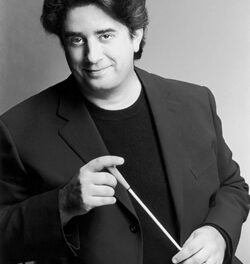Any fairly modern dictionary will tell you that a “collage” is some collection of seemingly unrelated bits and pieces. (The more elderly dictionaries don’t recognize the word.) But on a splendid spring evening in the Talley Ballroom, Music@NC State staged the Spring Choral Collage as a collection of definitely related bits and pieces. Three large and two small ensembles participated, the full-size groups under the sure hand of conductor Nathan Leaf. Tom Koch provided skilled piano accompaniment, at times as an equal partner with the singers. Student accompanist Grace Lee performed similarly with the Men’s Choir.
Apparently the crowd favorites by the State Chorale were the Moses Hogan arrangement of the “Battle of Jericho” and Mack Wilberg’s version of “Old Joe Clark.” Their treatment of James Mulholland’s “A Red, Red Rose” (the Robert Burns poem) was especially lush and satisfying. For moving power, though, nothing was quite on a par with “Requiem” by Eliza Gilkyson. Choral conductor Craig Hella Johnson has arranged this “neo-folk” song into a choral work of the first order. Written in response to the dreadful Asian tsunami of December 2004, the text wails out that “all our homes are gone, our loved ones taken.” The composer, who reportedly possesses no particularly religious leanings, asks Mother Mary to “come and carry us in your embrace…in the dark night of the soul.” The appropriately somber performance could scarcely be improved upon.
The Men’s Choir opened with a precise reading of Grieg’s “Brothers, Sing On.” Here they sang a cappella and without score, a condition that seldom fails to ensure the finest performance of which a group is capable. The traditional American genre was covered with “git along home, Cindy, Cindy.” The “Red and White from State,” “I Wanna Go Back (to NCSU)” and the Alma Mater almost certainly elicited a tear (of happiness) from fans and alums.
The Women’s Choir brought up to date Henry Purcell’s (1659-1695) “Sound the Trumpet.” Their enunciation in both the English and the Latin texts was particularly praiseworthy. Probably the best work of this group occurred in the closing “Come to My Garden,” based upon the hundred-year-old story, The Secret Garden, by Frances Hodgson Burnett. Here piano and singers collaborated in entirely charming style.
The showmen, Grains of Time, offered “House of the Rising Sun.” They “Shoulda Said No,” but they were, nevertheless, “Going to a Place Nearby,” wink, wink! Their popularity with the near-capacity crowd was palpable. The Ladies in Red (a little irony here: they wore not a speck of red) claimed that “I’ve Got to Get Away,” so “Baby, Baby, Don’t Leave Me.” In their closest harmony they rhetorically asked, “What’s Time For?” since “I’d Wait a Thousand Years for You.”
These “bits and pieces” were pasted into a successful and satisfying collage.











